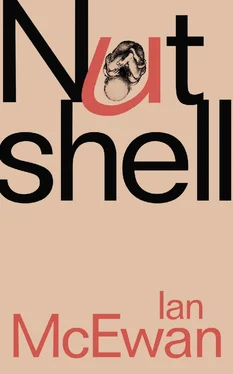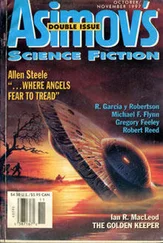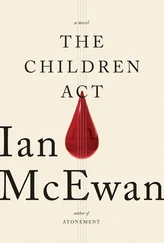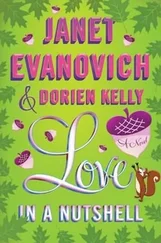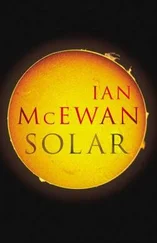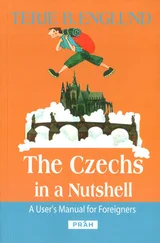Ian McEwan - Nutshell
Здесь есть возможность читать онлайн «Ian McEwan - Nutshell» весь текст электронной книги совершенно бесплатно (целиком полную версию без сокращений). В некоторых случаях можно слушать аудио, скачать через торрент в формате fb2 и присутствует краткое содержание. Год выпуска: 2016, Издательство: Jonathan Cape, Жанр: Современная проза, на английском языке. Описание произведения, (предисловие) а так же отзывы посетителей доступны на портале библиотеки ЛибКат.
- Название:Nutshell
- Автор:
- Издательство:Jonathan Cape
- Жанр:
- Год:2016
- ISBN:нет данных
- Рейтинг книги:3 / 5. Голосов: 1
-
Избранное:Добавить в избранное
- Отзывы:
-
Ваша оценка:
- 60
- 1
- 2
- 3
- 4
- 5
Nutshell: краткое содержание, описание и аннотация
Предлагаем к чтению аннотацию, описание, краткое содержание или предисловие (зависит от того, что написал сам автор книги «Nutshell»). Если вы не нашли необходимую информацию о книге — напишите в комментариях, мы постараемся отыскать её.
Told from a perspective unlike any other,
is a classic tale of murder and deceit from one of the world’s master storytellers.
Nutshell — читать онлайн бесплатно полную книгу (весь текст) целиком
Ниже представлен текст книги, разбитый по страницам. Система сохранения места последней прочитанной страницы, позволяет с удобством читать онлайн бесплатно книгу «Nutshell», без необходимости каждый раз заново искать на чём Вы остановились. Поставьте закладку, и сможете в любой момент перейти на страницу, на которой закончили чтение.
Интервал:
Закладка:
She’s been thinking about this. Thinking without my knowing. She’s a tigress.
Claude says. ‘The thing is—’
‘What I want,’ my mother says with a vehemence that hardens the walls around me, ‘is you tied into this, and I mean totally. If I fail, you fail. If I—’
The doorbell rings once, twice, three times, and we freeze. No one, in my experience, has ever come to the front door so late. Claude’s plan is so hopeless it’s failed already, for here are the police. No one else rings a bell with such dogged insistence. The kitchen was bugged long ago, they’ve heard it all. Trudy will have her way — we’ll all go down together. Babies Behind Bars was a too-long radio documentary I listened to one afternoon. Convicted murderers in the States, nursing mothers, were allowed to raise their infants in their cells. This was presented as an enlightened development. But I remember thinking, These babies have done nothing wrong. Set them free! Ah well. Only in America.
‘I’ll go.’
He gets up and crosses the room to the video entryphone on the wall by the kitchen door. He peers at the screen.
‘It’s your husband,’ he says dully.
‘Jesus.’ My mother pauses to think. ‘No use pretending I’m not here. You better hide somewhere. In the laundry room. He never—’
‘There’s someone with him. A woman. A young woman. Rather pretty, I’d say.’
Another silence. The bell rings again. Longer.
My mother’s voice is even, though strained. ‘In that case, go and let them in. But Claude, darling. Kindly put that glycol bottle away.’
SEVEN
CERTAIN ARTISTS IN print or paint flourish, like babies-to-be, in confined spaces. Their narrow subjects may confound or disappoint some. Courtship among the eighteenth-century gentry, life beneath the sail, talking rabbits, sculpted hares, fat people in oils, dog portraits, horse portraits, portraits of aristocrats, reclining nudes, Nativities by the million, and Crucifixions, Assumptions, bowls of fruit, flowers in vases. And Dutch bread and cheese with or without a knife on the side. Some give themselves in prose merely to the self. In science too, one dedicates his life to an Albanian snail, another to a virus. Darwin gave eight years to barnacles. And in wise later life, to earthworms. The Higgs boson, a tiny thing, perhaps not even a thing, was the lifetime’s pursuit of thousands. To be bound in a nutshell, see the world in two inches of ivory, in a grain of sand. Why not, when all of literature, all of art, of human endeavour, is just a speck in the universe of possible things. And even this universe may be a speck in a multitude of actual and possible universes.
So why not be an owl poet?
I know them by their footfalls. First down the open stairs to the kitchen comes Claude, then my father, followed by his newly signed-up friend, in high heels, boots perhaps, not ideal for stalking through woodland habitats. By nocturnal association I dress her in tight-fitting black leather jacket and jeans, let her be young, pale, pretty, her own woman. My placenta, like branching radio antennae, finely attuned, is receiving signals that my mother instantly detests her. Unreasonable thoughts are disrupting Trudy’s pulse, a new and ominous drumbeat rising as though from a distant jungle village speaks of possession, anger, jealousy. There could be trouble ahead.
I feel obliged for my father’s sake to defend our visitor: her subject is not so limited, owls being larger than bosons or barnacles, with two hundred species and wide folklorique resonance. Mostly of ill-omen. Unlike Trudy, with her visceral certainties, I quiver with doubts. Either my father, being neither sap nor saint, has come to present his lover, put my mother in her place (which is in his past) and show indifference to his brother’s infamy. Or he’s even more the sap, too much the saint, dropping in chastely with one of his authors as a form of social protection, in hopes of being in Trudy’s presence for as long as she’ll tolerate him. Or something beyond both, too opaque to determine. Simpler, for now at least, to follow my mother’s lead and assume that this friend is my father’s mistress.
No child, still less a foetus, has ever mastered the art of small talk, or would ever want to. It’s an adult device, a covenant with boredom and deceit. In this case mostly the latter. After a tentative scrape of chairs, the offer of wine, the pull of a cork, a comment from Claude about the heat draws my father’s neutral hum of assent. A fitful exchange between the brothers projects the lie that our visitors happened to be passing. Trudy remains silent, even when the poet is introduced as Elodie. No one comments on the elegant social geometry of a married couple and their lovers around a table, raising a glass, a tableau vivant of brittle modern life.
My father appears unfazed to find his brother in his kitchen, opening the wine, playing the host. So John Cairncross was never the dupe, the unknowing cuckold. My underestimated father blandly sips and asks Trudy how she’s feeling. Not too tired, he hopes. Which may or may not be a gentle dig, a sexual allusion. That plaintive tone of his has vanished. Distance or irony has replaced it. Only satisfied desire could have freed him. Trudy and Claude must wonder why their murderee is here, what he wants, but it wouldn’t be right to ask.
Instead, Claude asks Elodie if she lives nearby. No, she doesn’t. She lives in Devon, in a studio, on a farm, near a river, by which she might be letting Trudy know that here in London she’ll be overnighting between John’s Shoreditch sheets. She’s staking a claim. I like the sound of her voice, the human approximation, I would say, of the oboe, slightly cracked, with a quack on the vowels. And towards the end of her phrases, she speaks through a gargling, growling sound that American linguists have dubbed ‘vocal fry’. Spreading through the Western world, much discussed on the radio, of unknown aetiology, signifying, it’s thought, sophistication, found mostly in young, educated women. A pleasing puzzle. With such a voice she might hold her own against my mother.
Nothing in my father’s manner suggests that only this afternoon his brother fronted him five thousand pounds in cash. No gratitude, same old fraternal contempt. That must stir Claude’s ancient hatred. And in me, something more hypothetical, a potential grudge. Even as I cast my father as a lovelorn fool, I always assumed that if matters became intolerable with Claude, and if I failed to unite my parents, I might live with my father, at least for a while. Until I got on my feet. But I don’t think this poet would take me on — tight black jeans and leather jacket is not maternity wear. That’s part of her allure. In my narrow view, my father would be better single. Pale beauty and an assured duck’s voice are not my allies. But there may be nothing between them, and I like her.
Claude has just said, ‘A studio? On a farm? How marvellous.’ Elodie is describing in her urban growl an A-frame cabin on the banks of a dark and rushing river that foams round granite boulders, a dodgy footbridge to the other side, a copse of beeches and birch, a bright clearing spangled with anemones and celandines, bluebells and spurge.
‘Perfect for a nature poet,’ Claude says.
So true and dull is this that Elodie falters. He presses in. ‘How far is it all from London?’
By ‘all’ he refers to the pointless river and rocks and trees and flowers. Deflated, she can barely fry her words. ‘About two hundred miles.’
She’s guessed that he’ll ask her about the nearest railway station and how long the journey takes, information he’ll soon forget. But he asks, she answers, and we three listen, not stupefied or even mildly bored. Each of us, from each different point of view, is gripped by what’s not being said. The lovers, if Elodie is one, the two parties external to the marriage, are the dual charge that will blast this household apart. And blow me upwards, hellwards, to my thirteenth floor.
Читать дальшеИнтервал:
Закладка:
Похожие книги на «Nutshell»
Представляем Вашему вниманию похожие книги на «Nutshell» списком для выбора. Мы отобрали схожую по названию и смыслу литературу в надежде предоставить читателям больше вариантов отыскать новые, интересные, ещё непрочитанные произведения.
Обсуждение, отзывы о книге «Nutshell» и просто собственные мнения читателей. Оставьте ваши комментарии, напишите, что Вы думаете о произведении, его смысле или главных героях. Укажите что конкретно понравилось, а что нет, и почему Вы так считаете.
